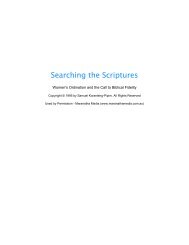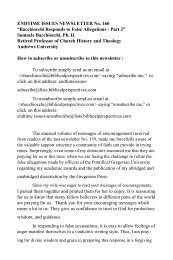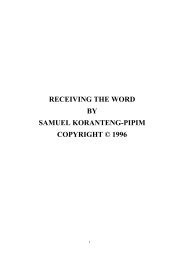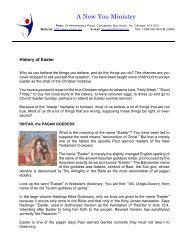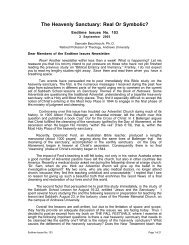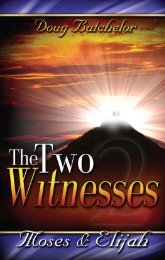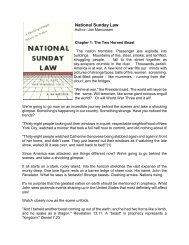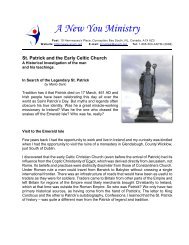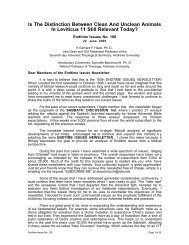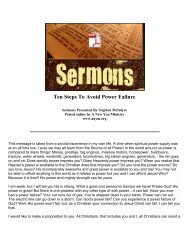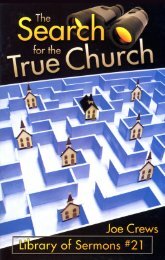Bible Readings for the Home Circleâ1914 - A New You Ministry
Bible Readings for the Home Circleâ1914 - A New You Ministry
Bible Readings for the Home Circleâ1914 - A New You Ministry
Create successful ePaper yourself
Turn your PDF publications into a flip-book with our unique Google optimized e-Paper software.
BIBLE READINGS<br />
Wednesday or Lent stands exactly on <strong>the</strong> same footing as <strong>the</strong> observance of<br />
Sunday.” “Constantine’s decree was <strong>the</strong> first public step in establishing <strong>the</strong><br />
first day of <strong>the</strong> week as a day on which <strong>the</strong>re should be secular rest as well as<br />
religious worship. . . . Into <strong>the</strong> rest of Sunday no divine law enters.” “The Ten<br />
Commandments,” Trubners & Co.<br />
Canon Knox-Little, replying to those who quote <strong>the</strong> example of Christ<br />
against <strong>the</strong> High-church ritualism, says:—<br />
“It is certain that our Lord when on earth did observe Saturday, and did not<br />
observe Sunday.” “If <strong>the</strong>y are consistent, as I have said, <strong>the</strong>y must keep Saturday,<br />
not Sunday, as <strong>the</strong> day of rest.” “Sacerdotalism,” Longman Company.<br />
Sir William Domville: “Centuries of <strong>the</strong> Christian era passed away be<strong>for</strong>e<br />
<strong>the</strong> Sunday was observed by <strong>the</strong> Christian church as a Sabbath.” “Examination<br />
of Six Texts,” chap. 8, page 291.<br />
WRITERS OF OTHER CHURCHES<br />
Bishop Grimelund, of Norway (Lu<strong>the</strong>ran): “The Christians in <strong>the</strong> ancient<br />
church very soon distinguished <strong>the</strong> first day of <strong>the</strong> week, Sunday; however, not<br />
as a sabbath, but as an assembly day of <strong>the</strong> church, to study <strong>the</strong> Word of God<br />
toge<strong>the</strong>r.” “Geschichte des Sonntags,” page 60.<br />
Dr. R. W. Dale (British Congregationalist): “It is quite clear that however<br />
rigidly or devotedly we may spend Sunday, we are not keeping <strong>the</strong> Sabbath. . . .<br />
The Sabbath was founded on a specific, divine command. We can plead no<br />
such command <strong>for</strong> <strong>the</strong> observance of Sunday. . . . There is not a single line in <strong>the</strong><br />
<strong>New</strong> Testament to suggest that we incur any penalty by violating <strong>the</strong> supposed<br />
sanctity of Sunday.” “The Ten Commandments,” Hodder and Stoughton, pages<br />
106, 107.<br />
Dr. Lyman Abbott (American Congregationalist): “The current notion that<br />
Christ and His apostles authoritatively substituted <strong>the</strong> first day <strong>for</strong> <strong>the</strong> seventh,<br />
is absolutely without any authority in <strong>the</strong> <strong>New</strong> Testament.” Christian Union,<br />
June 26, 1890.<br />
Dr. Edward T. Hiscock (Baptist): “There was and is a commandment to<br />
‘keep holy <strong>the</strong> Sabbath day,’ but that Sabbath was not Sunday. it will, however,<br />
be readily said, and with some show of triumph, that <strong>the</strong> Sabbath was transferred<br />
from <strong>the</strong> seventh to <strong>the</strong> first day of <strong>the</strong> week.<br />
Where can <strong>the</strong> record of such a transaction be found Not in <strong>the</strong> <strong>New</strong><br />
Testament—absolutely not.” The <strong>New</strong> York Examiner, Nov. 16, 1893. {456<br />
456}<br />
Dr. D. H. Lucar, (Disciple): “There is no direct Scriptural authority <strong>for</strong><br />
designating <strong>the</strong> first day <strong>the</strong> Lord’s day.” Christian Oracle, Jan. 23,1890.<br />
Cardinal Gibbons (Roman Catholic): “<strong>You</strong> may read <strong>the</strong> <strong>Bible</strong> from Genesis<br />
to Revelation, and you will not find a single line authorizing <strong>the</strong> sanctification<br />
of Sunday.” “Faith of Our Fa<strong>the</strong>rs,” edition 1892, page 111.<br />
Prize Essay of American Sunday-school Union: “Up to <strong>the</strong> time of Christ’s<br />
death, no change had been made in <strong>the</strong> day. . . . So far as <strong>the</strong> record shows, <strong>the</strong>y<br />
[<strong>the</strong> apostles] did not give any explicit command enjoining <strong>the</strong> abandonment of<br />
<strong>the</strong> seventh-day Sabbath, and its observance on <strong>the</strong> first day of <strong>the</strong> week.”<br />
“Lord’s Day,” pages 185, 186.<br />
ENCYCLOPEDIAS AND CHURCH MANUALS<br />
WALKING AS HE WALKED<br />
“Dictionary of Christian Antiquities:” “The notion of a <strong>for</strong>mal substitution<br />
by apostolic authority of <strong>the</strong> Lord’s day [meaning Sunday] <strong>for</strong> <strong>the</strong> Jewish<br />
Sabbath, and <strong>the</strong> transference to it, perhaps in a spiritualized <strong>for</strong>m, of <strong>the</strong> Sabbatical<br />
obligation established by <strong>the</strong> promulgation of <strong>the</strong> fourth commandment,<br />
has no basis whatever, ei<strong>the</strong>r in <strong>the</strong> Holy Scriptures or in Christian antiquity.”<br />
Article, “Sabbath,” Smith and Cheetham.<br />
“Cyclopedia of Biblical Theology:” “It must be confessed that <strong>the</strong>re is no<br />
law in <strong>the</strong> <strong>New</strong> Testament concerning <strong>the</strong> first day.” Article “Sabbath,”<br />
McClintock and Strong.<br />
Methodist Episcopal “Theological Compend,” by Amos Binney: “It is true,<br />
<strong>the</strong>re is no positive command <strong>for</strong> infant baptism. . . . Nor is <strong>the</strong>re any <strong>for</strong> keeping<br />
holy <strong>the</strong> first day of <strong>the</strong> week.” Pages 180, 181.<br />
Protestant Episcopal “Manual of Christian Doctrine:” “Is <strong>the</strong>re any command<br />
in <strong>the</strong> <strong>New</strong> Testament to change <strong>the</strong> day of weekly rest from Satuday—<br />
None.” Page 127.<br />
Protestant Episcopal “Explanation of Catechism:” “The day is now<br />
changed from <strong>the</strong> seventh to <strong>the</strong> first day; . . . but as we meet with no Scriptural<br />
direction <strong>for</strong> <strong>the</strong> change, we may conclude it was done by <strong>the</strong> authority of <strong>the</strong><br />
church.”<br />
6. What influence do <strong>the</strong> <strong>Bible</strong> and history show working in <strong>the</strong><br />
church immediately after apostolic days<br />
“Also of your own selves shall men arise, speaking perverse things, to<br />
draw away disciples after <strong>the</strong>m.” Acts 20:30.<br />
NOTE.— “In <strong>the</strong> interval between <strong>the</strong> days of <strong>the</strong> apostles and <strong>the</strong> conversion<br />
of Constantine. <strong>the</strong> Christian commonwealth changed its aspect.<br />
. . . Rites and ceremonies of which nei<strong>the</strong>r Paul nor Peter ever heard, crept<br />
silently into use, and <strong>the</strong>n claimed <strong>the</strong> rank of divine institutions.” Dr. W.<br />
D. Killen’s (Presbyterian) “The Ancient Church,” Preface.<br />
7. What did Christ say of worship based upon <strong>the</strong> commandments of<br />
men<br />
“In vain <strong>the</strong>y do worship Me, teaching <strong>for</strong> doctrines <strong>the</strong> commandments<br />
of men.” Matt. 15:9.<br />
8. What did He say should be done with every plant not planted by<br />
God<br />
“Every plant, which My Heavenly Fa<strong>the</strong>r hath not planted, shall be<br />
rooted up.” Verse 13.<br />
THE SABBATH IN HISTORY<br />
{457<br />
457}<br />
1. WHEN and by what acts was <strong>the</strong> Sabbath made<br />
“And on <strong>the</strong> seventh day God ended His work which He had made;




